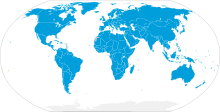
Internationality is the concept of something "involving more than a single country", and may suggest interaction between or encompassing more than one nation, or generally beyond national boundaries. For example, international law, which is applied by more than one country and usually everywhere on Earth, and international language which is a language spoken by residents of more than one country. "International" is therefore also sometimes used as a synonym for "global".
As the United Nations noted in its Yearbook of the United Nations Commission on International Trade Law:
[T]here was a well-established tradition at the Hague Conference on Private International Law of not defining internationality. Comparative studies show that at least two concepts of internationality coexist in most countries: a legal concept and an economic concept. The legal concept consists in taking account of either the nationality or the geographical location of the parties concerned. The economic concept relates to the flow of goods, persons, financiers and so forth across borders. According to the latter sense of the term, a relationship qualifies as "international*' if it was entered into by partners located in the same territory but with one of the elements of the relationship to be performed in a different State.[1]
- ^ United Nations Commission On International Trade Law, Yearbook of the United Nations Commission on International Trade Law, 1999, Vol. XXX (2001), p. 102.